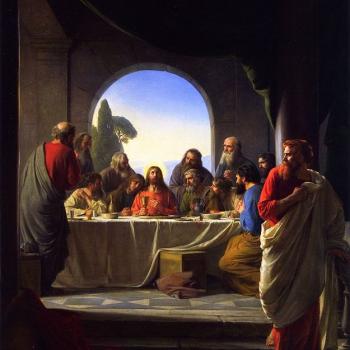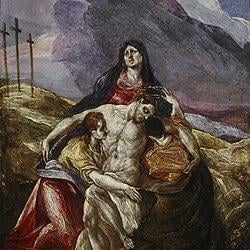3) God Ignores the Objection
In the entire Bible, God never listens to someone's objection and says, "You're right. You've convinced me that you're not as qualified as I thought. I'll keep looking." The prophets were not chosen because they were ready to be chosen, because they felt confident in their abilities and it was a good time for them to clear their calendars of other commitments so they could be prophets. They were called when God was ready to call them.
4) God's Reassurance of Commitment to the Prophet
God reassures the prophet that the divine presence will abide with him in carrying out the call. The prophet's job description is not to speak out of his own wisdom or eloquence, but to be a messenger for God, to do and speak what is commanded. In fulfilling this task, God promises to be with the prophet as deliverer.
"Hail, O Favored one! Do not be afraid, The Lord is with you! . . . Nothing will be impossible with God." Mary the prophet urges us to be on the lookout for signs of our own resistance to God's call. If God would not listen to her rather convincing objection, why would God listen to ours? How frightening to have our familiar excuses pulled out from under us by God's reassurance that God will be with us! God will help us bear the burden of answering the call. God will give us grace to meet its sometimes grueling demands.
Of what does Mary's call to be a prophet consist? First, to be the mother of her Son. I wonder if, as she heard reports of his fearless teaching and growing enemies, she flashed back to the manger night when she held him in her arms. I wonder if she flashed forward in an anxious vision of a future, like the depictions of Mary holding the crucified Jesus called Pietà? (Italian for pity). Then she would hold his crucified body across her lap, yearning, too late, to cradle him and protect him again. I've never seen the Pietà in a snow dome.
In fulfilling her prophetic call to be his mother, I imagine her heart aches when he shows signs of a dangerous vocation—when he stays behind at the Temple and she has to search for him for three days; when she and his brothers come to stand outside the house where he is teaching (perhaps to warn him to stop speaking out so boldly), and he refuses to interrupt his teachings to see them. After all, they deserve no more special attention than any of his other disciples who are all his family if they obey God. As his mother, her feelings are hurt and her heart is filled with fear for him.
But she does not turn against him. Instead, she grows into the second portion of her prophetic call: to be not just the mother, but a disciple of her son. John tells us she was there at the cross, risking her life along with the other women. Mary is the first disciple. She modeled faithfulness for her unborn son in her words to the angel: "Let it to me according to your Word." She later modeled her own faithfulness after her grown son's example.
What happens to Mary after her son's death? Luke tells us in the first chapter of Acts that she was there in the upper room with the disciples after his resurrection and ascension to be with God. Perhaps she went from there to share with others her wisdom on how to be a disciple of her Risen Son.
We need her wisdom this Advent. We are all, like her in this scene from Luke chapter 1, being called by God. We are all resisting and offering objections. We are all experiencing push back from God, as God objects to our objections. We are all being offered the reassurance that "Nothing will be impossible with God" (Lk. 1:37).
We are all called to prepare for the birth of the baby and then, as he grows and becomes strong (Lk. 1:80), to follow him all the days of our lives. For that journey, we need a mother's wisdom.





